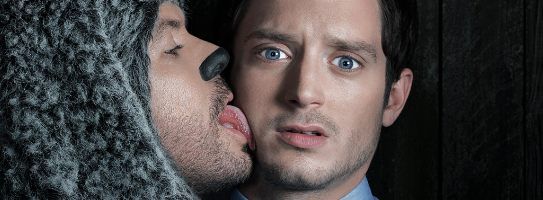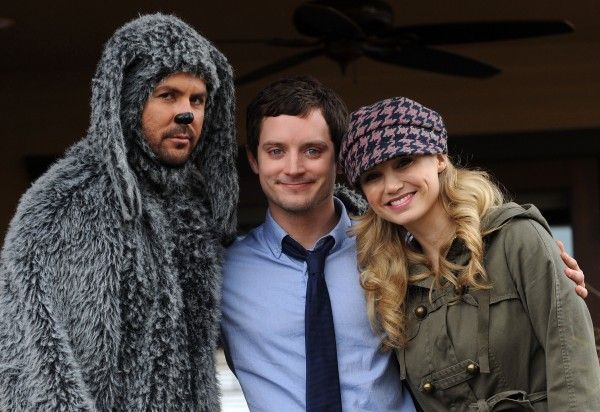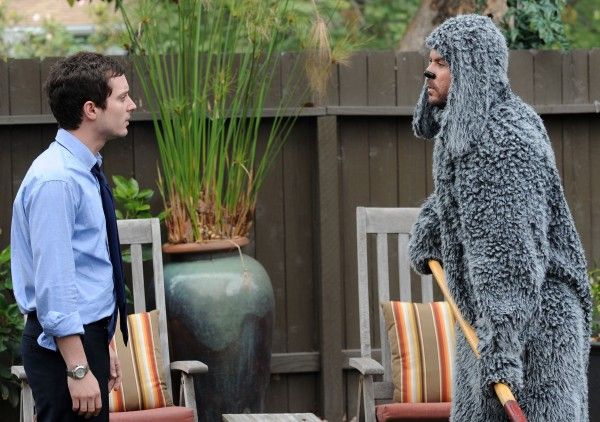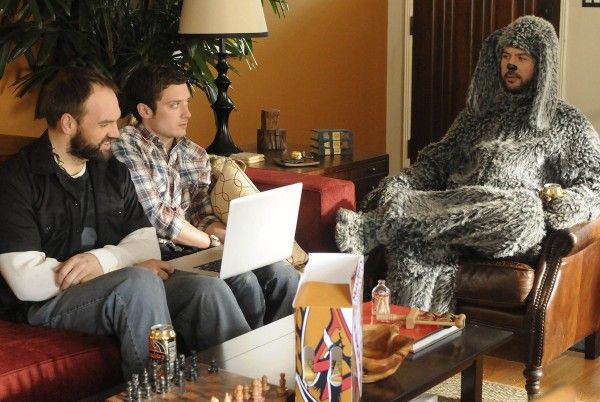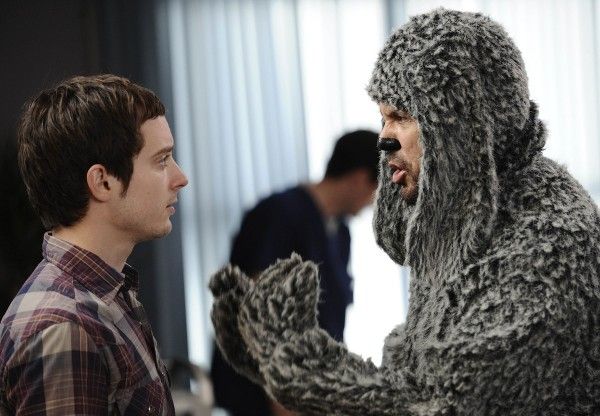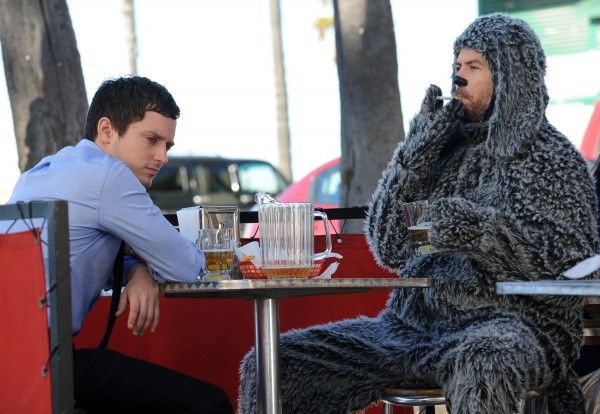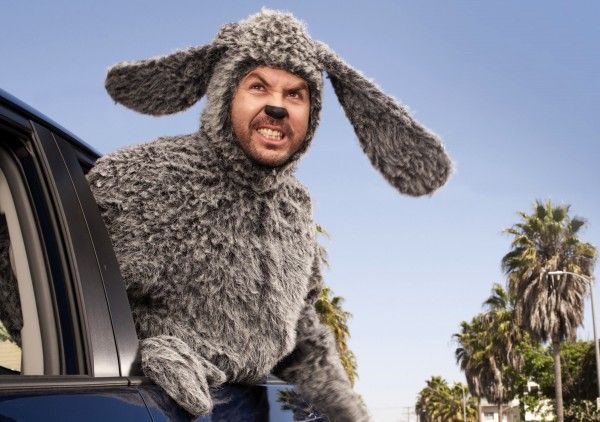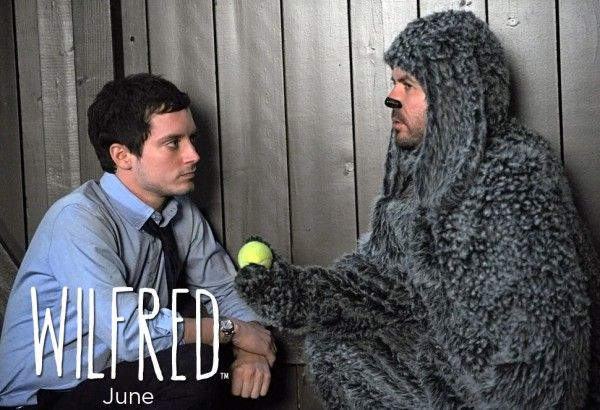The half-hour, live-action comedy Wilfred is about a young man named Ryan (Elijah Wood), who is struggling unsuccessfully to make his way in the world until he forms a unique friendship with Wilfred (Jason Gann), his neighbor’s canine pet. While everyone else sees Wilfred as just a dog, Ryan sees a crude yet always honest Australian guy in a cheap dog suit. As their peculiar relationship develops and they find themselves in some rather outrageous situations, Wilfred shows Ryan how to overcome his fears and embrace the world around him.
During a recent interview to promote the show’s premiere on FX, actor Elijah Wood talked about why he decided to do a TV series, how he feels that honesty and truth are a solid base for any comedy, why he enjoys playing a character that’s so broken, and how he’s attracted to scripts that he responds to, on a gut level. Check out what he had to say after the jump:
Question: Have you been offered a lot of TV roles, in the past? What made you chose this one?
ELIJAH WOOD: I actually don’t get offered a lot of TV roles. I read a few scripts that were mainly dramas. I was just interested in taking a look at television because I really had never seen what was available and what people were making. It’s changed so much, even in the last five years. This was one of the last scripts that I was sent, and my manager sent it to me and said it was the funniest thing that she’d ever read. I loved it and it blew my mind. It was unlike anything I’ve read or seen on television. A perfect extreme in funny, but also sort of cerebral and strange and difficult to describe, which I think is always a good thing.
How did you get involved with the American version of this Australian show?
WOOD: My experience with this was that, before I read the pilot script, I was not aware of the Australian show. But, when I was sent the script, it came attached with information about the original show and indicated that Jason [Gann], who had created the original show, was involved in the creation of this incarnation, as well as reprising Wilfred. For me, immediately even before reading the script, that gave me such confidence. It’s so rare for a show from a foreign country to actually include it’s original creator. I knew that this was immediately going to have a sense of integrity attached to it, in whatever incarnation it was going to be from it’s origin. And then, I read it and fell in love with the pilot.
From there, I met with David Zuckerman, who’s our show runner and head writer, and we talked for about an hour about the possibilities for the show, where it was going to go from the pilot, and all of these ideas that he had for the character of Ryan, and for the relationship between him and Wilfred, and I just became more and more excited about it. I loved the pilot, but the world that opened up beyond that, in talking with David, was so exciting to me, particularly in that he was imagining and crafting a comedy show that had darkness to it, that had a cerebral aspect to it, that was not necessarily easy to peg, and that allowed us to explore quite a lot within the context of what could simply be described as a man befriending a man in a dog suit. The very notion of being a part of something like that was so exciting and interesting. From there, it was just a normal process. I auditioned and then I met Jason, and we immediately had a blast in the room, so we ended up doing it.
What can you say about your character?
WOOD: Ryan is essentially a guy who had followed a path that was ultimately not of his choosing, for far too long. He listened to his family, listened to his father, and did what he thought everyone else wanted him to do, as opposed to following his own interests. As a result of that, in this pilot, we find him in a place where he’s essentially hit a wall, and it’s made him suicidal. He’s a broken individual. He’s someone that hasn’t really busted out of himself to live freely, to live with confidence and to define himself, and ultimately that’s where Wilfred arrives. He arrives in that moment of crisis to push Ryan outside of the self-imposed and family-imposed boundaries that have been created around him.
What is your definition of a good formula for comedic TV?
WOOD: From my experience, what I think is a solid base for any comedy is just honesty and truth, and it coming from a real place. As surreal as this show gets and is, ultimately, we’re dealing with a character that most can’t see the way that I can see it. But, outside of that, we’re playing most of the scenarios for honesty, and I think that that is always an important base. I think something truly funny will always come out of that.
How did your family and friends respond to the news, when you told then you’d be staring in Wilfred? Are they looking forward to watching the show?
WOOD: Yes. My family and friends were very intrigued at the notion of the premise of the show. We shot a number of promos before we actually went into production, and they started to air while we were shooting, which gave people a real sense of what it is that we were trying to do, and tonally gave an idea of the show we were trying to make. Since those have come out, a lot of family and friends have seen those shorts, and everyone’s looking forward to it. I’m very excited and intrigued, as they should be.
What is it like bringing Ryan to life? Have you picked up any of his bad habits?
WOOD: I certainly haven’t picked up any of Ryan’s bad habits. Ryan and I are very different, thankfully. I think I’m a lot more pulled together than Ryan is. No bad habits have entered into my life, as a result of playing him. He’s an interesting character to play. He’s in a constant struggle. On the surface level, he is interacting with Wilfred and takes that for granted and accepts that relationship, as does the audience. But, throughout the show, as we were filming it, I was constantly thinking about what was happening in reality and what he was really going through. I’m not necessarily playing that, and I don’t have to play that, but I think there is a lot of depth to what Ryan’s experience is. He’s broken and he’s constantly in the state of trying to repair himself, and he’s working really hard to stay above water. That’s interesting to play.
Did you pull from any films or life experiences, when crafting this show?
WOOD: Jason and I immediately thought of Harvey. I’m a huge fan of that film. I don’t know how many times I’ve seen it, but it was interesting the parallel. It’s obviously similar, but it’s extremely different. That notion of our imagined friend is quite similar, and I think there’s something beautiful about that.
Wilfred is Ryan’s coping mechanism. How do you cope with stress and problems? Who do you see and talk to?
WOOD: My coping mechanism? I don’t know. We all deal with a certain amount of stress, on a day-to-day basis. I probably smoke too many cigarettes, which isn’t a very good thing. I don’t have any extraordinary coping mechanism. I certainly don’t talk to a dog.
The character of Ryan starts out fairly depressed. Do you feel that he’s essentially the straight man in a comedy double-act, or does he not fit that definition?
WOOD: Yes, I think he is the straight man. Ultimately, I think Ryan is just trying to get everything together, constantly. He’s essentially reacting to the world around him, and to the scenarios that Wilfred is trying to put him into, and the direction that he’s being pulled. So, he is the straight man, but he’s also in this time of crisis in his life and he’s just trying to hold it all together, all the time. He’s having a genuine relationship with this man in a dog suit, and then also trying to balance that relationship with the real people who he knows can’t see that man in a dog suit. In the midst of all that, he’s trying to rebuild himself and to be the best person that he can be.
Was there a lot of improv going on, during filming?
WOOD: They’re very finely crafted scripts. They’re incredibly detailed and layered, which isn’t to say that there isn’t room for improv because there certainly is, but there’s also a lot of story to tell, within each episode, that is important to get across, and there are finely crafted joked within that as well. There probably is room to play around, and Jason and I certainly have the conformability with each other and within our characters to be able to do that. There’s also just so much that we have to get through, each day, that there’s just simply not a lot of time for that. We were doing eight to 10 pages a day, so we had a lot of work.
Do you have a favorite scene in Season 1?
WOOD: The roof argument was a lot of fun. That’s something that I was really looking forward to, from reading it in the script, and ultimately shooting it because it’s so ridiculously heightened. I don’t know. There are so many sequences that we would approach, every day. I swear to God, every day, coming to work, I approached it with so much excitement because there was something that we were excited to shoot and bring to life. We were lucky to work with such wonderful scripts. Our writers, and everyone together, created such finely layered, very interesting, hilarious scripts that were exciting to approach. So, it’s difficult to pick one sequence out in particular.
How hard or easy is it to work opposite someone in a dog suit and react to that?
WOOD: I have to say that we have become so used to the environment that we’re working in, and we’ve become used to that relationship and work within that relationship, that I’ve almost literally forgotten that he’s in a suit. I don’t see Wilfred like that. I have ceased to see that. It’s actually really funny. When we went to American Idol and sat in the audience to cause of a bit of a stir, because I’m so used to seeing Jason like that and it almost means nothing to me anymore, it was really interesting for me to be in an environment where he did stand out and where people would look at him as a man in a dog suit. It was a really interesting thing for me to take a step back and actually look at it from a different perspective because I’ve become so used to it. Acting with him, we’re literally just two guys playing these characters. I don’t really think about the way he’s perceived, or the fact that he’s in a suit anymore. He’s become real to me.
Are viewers going to meet any other people in animal suits, over the course of the season, or is Wilfred unique?
WOOD: Within this iteration, Wilfred is unique. There were other animals present in the Australian version, but so far in the story that we’re telling, Wilfred is unique.
There is quite a bit of ambiguity about Wilfred’s actions, particularly when he leaves the wallet outside of the guy’s window. At the end of the day, do you ultimately see Wilfred as a positive influence or a negative influence in Ryan’s life?
WOOD: I think that it’s always going to oscillate. What I think is interesting is that the results, regardless of where it feels that the motivation is coming from, whether it’s a negative one or a positive one, tends to be a positive one for Ryan, despite the fact that it may be cloaked in Wilfred’s self-interest or sabotage. The end result tends to be that Ryan does take something positive away from it, but I love that ambiguity. You’re never quite sure where Wilfred stands, or what Wilfred really is to him, and that carries on throughout the season. It’s always oscillating. There is a slight bit of danger and discomfort in that relationship.
With this concept for a show, how difficult is it to sometimes get through shooting a full episode?
WOOD: The last day, I totally lost it, but up until then, I hadn’t. There was just one line that Jason [Gann] had that was so weird and good. But, it’s not to say that, every day, were working on material that I found hilarious, but the atmosphere on set was extremely fun and very funny. We were having a blast, every day, but at the same time, we were also taking what we were doing seriously. In the context of that work, we buckled down and didn’t let ourselves lose it too much because we had so much to get through, every day.
Did you have a dog growing up, and did you have any experiences with them where you learned something from them?
WOOD: Yes, I grew up with dogs. I think you do talk to dogs, but I never felt like I had a connection, where I was talking to my dog like a person. But, what ends up happening – and I think that all dog and cat owners can relate to this – is that, when you have an animal in your home, a relationship forms very quickly, where that animal ceases to be an animal to you. It feels like a member of your family. So, I think everybody can relate, to a certain degree, to an animal that you have slightly personified because it ceases to be in the context of just simply a dog, or simply a cat. They’re a part of your life and there’s a genuine relationship at play. I definitely can relate to that. You recognize qualities that are semi-human. You see their real personalities and their thought processes.
You seem to have a knack for choosing roles in movies that are interesting and challenging. Are there certain types of projects that you gravitate towards, or a specific thing that you look for in a script?
WOOD: On the basest of levels, I’m looking for something that I respond to. I think it’s hard enough to find quality scripts and work that you just respond to, on a gut level. But, more than that, I think I’m also always looking for something really different and that is unlike anything I’ve done before, both in terms of the project as a whole, and also in terms of what the role would entail. I want to continue to challenge myself, but also to work on projects that are unique and different. I’m definitely attracted to things that are less easily defined, and this is a perfect example of that. It’s never interesting to do anything truly conventional. I think convention can have its merits, certainly, but it’s far more interesting to travel roads that are less traveled, and that are a bit more fascinating and certainly more challenging. I’ve never done comedy before, and I was very interested in the notion of delving into comedy and working within a medium that I’ve not worked in before.

